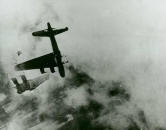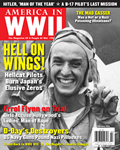Did the soldiers of the Good War really come home psychologically unscathed by the horror and stress they experienced? Or did they simply suffer in silence?
by Mark D. Van Ells

 Combatstirs up a whirlwind of conflicting emotions. Feelings of exhilaration, love, hatred, guilt, rage, helplessness, disgust, and fear race through the minds of soldiers in battle. How the human mind responds to these emotions has long perplexed military officials, medical professionals, and especially veterans and their families. Sixteen million Americans served in World War II. Of those, perhaps one million were exposed to extended periods of combat. These men often suffered deep emotional pain as a result of their battle experiences, and the effects lasted for years. Some carried the pain for the rest of their lives.
Combatstirs up a whirlwind of conflicting emotions. Feelings of exhilaration, love, hatred, guilt, rage, helplessness, disgust, and fear race through the minds of soldiers in battle. How the human mind responds to these emotions has long perplexed military officials, medical professionals, and especially veterans and their families. Sixteen million Americans served in World War II. Of those, perhaps one million were exposed to extended periods of combat. These men often suffered deep emotional pain as a result of their battle experiences, and the effects lasted for years. Some carried the pain for the rest of their lives.

 To be effective in combat, soldiers must learn to suppress the feelings it generates, a process psychiatrists refer to as "emotional numbing." For some, the numbing begins in basic training. In the civilian world, killing is a most grievous crime, but in war, it is a necessity. According to James Jones, noted novelist and combat veteran, "To teach a young American male to love war and enjoy killing his fellow man–even a Jap or a Nazi–was about comparable to teaching his fresh, dewy-eyed, virginal sister to love the physical aspects of simple [sex]."
To be effective in combat, soldiers must learn to suppress the feelings it generates, a process psychiatrists refer to as "emotional numbing." For some, the numbing begins in basic training. In the civilian world, killing is a most grievous crime, but in war, it is a necessity. According to James Jones, noted novelist and combat veteran, "To teach a young American male to love war and enjoy killing his fellow man–even a Jap or a Nazi–was about comparable to teaching his fresh, dewy-eyed, virginal sister to love the physical aspects of simple [sex]."
The anticipation of combat was an emotionally taxing experience in its own right. Raymond Gantter of the 1st Infantry Division simply denied the prospect of death. "I willfully repudiate the possibility of death," he wrote his wife. "My reason, insisting on cold logic, tells me ‘maybe,’ but emotionally I reject it entirely." According to Jones, the soldier must think of himself as "essentially a dead man" so he can "function as he ought to function under fire."
Fear is the most common emotion associated with combat. "We are all afraid," wrote B-17 pilot John Bennett, "and only liars and fools fail to admit it." The aspects of combat that soldiers feared most varied from individual to individual. Gantter found patrolling behind German lines the most unbearable. He wrote in his wartime diary:
I think I have never been so cold, so wretched, so frightened. It is the slow piling up of fear that is so intolerable. Fear moves swiftly in battle, strikes hard with each shell, each new danger, and as long as there’s action, you don’t have time to be frightened. But this is a slow fear, heavy and stomach filling. Slow, slow…all your movements are careful and slow, and pain is slow and fear is slow and the beat of your heart is the only rapid rhythm of the night…a muttering drum easily punctured and stilled.
What marine E.B. Sledge feared most was shell fire. "During prolonged shelling," he wrote, "I often had to restrain myself and fight back a wild, inexorable urge to scream, to sob, and to cry." For airman Bennett it was the feeling of helplessness. "The bomber pilot can’t fight back, but must sit there and take it," he wrote. Jones reflected, "Learning to live with [fear], and to go ahead in spite of it took practice and a certain overlay of bitter panache it took time to acquire. There were damned few fearless men."
Study after study has shown that the primary motivating factor for most men in battle is not patriotism but the respect of their buddies. Combat veterans develop unique bonds, and watching close friends die was tremendously painful. Jones recalled a time when he saw a fellow soldier killed: "He cried out, ‘Oh, my God!’ in an awful, grimly comic, burbling kind of voice. Thinking about him, it seemed to me that his yell had been for all of us lying there, and I felt like crying." Many soldiers felt pangs of guilt about escaping death when their friends died, a phenomenon known as "survivor guilt." Francis O’Donnell of the 1st Infantry Division survived the carnage of Omaha Beach on D-Day in June 1944, but asked himself, "Why was I chosen to make it when men with wives and children didn’t?"
Soldiers felt guilty about killing the enemy, too. Sledge remembered shooting a Japanese soldier about to throw a grenade at him. "I had just killed a man at close range," he wrote. "That I had clearly seen the pain on his face came as a jolt…. The expression on that man’s face filled me with shame and then disgust for the war and all the misery it was causing." Half a world away, in Italy, future US Senator Daniel Inouye of Hawaii–then a member of the 442nd Regimental Combat Team–entered a farmhouse and found an injured German soldier inside. The wounded man "reached into his tunic," he wrote, "and I thought he was going for a gun, and I pumped the last three shots in my rifle clip into his chest." As the man fell, he "held up a snapshot, clutching it in death"–a photograph of a woman and two children whom Inouye presumed were the dead man’s family. "For days I fought the image down," he remembered, "but it kept returning."
The sights and sounds of battle could be disturbing. In Burma, Richard Bates of the US special operations unit commonly known as Merrill’s Marauders remembered listening to a wounded Japanese soldier "scream all night" and then "spending three days out there looking at that corpse and watching it swell up." He found nighttime in Burma most unsettling. "You think the silence bothers you," he remembered, "but in the jungle areas the noise bothers you. There are so many bugs making noise, and so many things going, that if things are quiet it’s almost deafening. God, anyone could pick up a rung on me and I wouldn’t hear." For many, continued exposure to combat conditions wore them down. "It was not going [into battle] the one time, but the going back again and again, that finally got to you," " a sailor from the USS Yorktowntold Jones in a Honolulu bar in May 1942. A navy veteran from Texas compared his service on a destroyer off the Tokyo mainland during the Okinawa campaign to a death sentence:
They strap him in the electric chair, he can see the warden’s hand on the switch, he knows he is going to die, and he waits all day. Then at the end of the day they come and get him, take him back to his cell, and all night the other prisoners try to kill him. The next day they come get him and strap him in the chair and he expects to die again–this goes on and on day and night for three months….
Combat veterans had to find ways to block out the madness and tragedy of war. Marine non commissioned officer. William Manchester claimed that "a foot soldier retains his sanity only by hardening himself." Wrote E.B. Sledge, "I vividly recall grimly making a pledge with myself. The Japanese might kill or wound me, but they wouldn’t crack me up." Inouye remembered that humor was effective, even in the face of death. "Even knowing that every agonizing second may be their last on earth," he wrote, "a man has to vent the terrible pressures inside, and of course laughing is better than crying. So we laughed, sometimes heartlessly, sometimes hysterically, sometimes in the final instant of life."
Soldiers also turned to alcohol to numb themselves. It was widely available to troops in Europe as they liberated towns from German control. "Wine was given to us by the gallon," wrote infantryman Charles Golub from France to his wife in Massachusetts. Wilbur Berget of the 12th Armored Division wrote to his parents that drinking "makes me forget where I am and brings me back to better days, because it changes the ever present atmosphere that adheres to everything we do or say during the day, [and] can expel the serious thoughts that run through our minds as we go about this business of fighting a war."
Some soldiers could not cope with the stress of combat. Nearly every combat veteran can recall an instance when someone broke down under fire. During the Battle of the Bulge, Gantter recalled, a seasoned veteran of his 1st Infantry Division suddenly "went to pieces" during an artillery barrage, "weeping hysterically and cowering in a dugout." Combat-induced mental and emotional breakdowns like this have always been a part of war. Historically, soldiers who fell apart in battle were viewed as cowards or considered predisposed to psychological problems. During World War I, the phenomenon was known as "shell shock." In World War II, the term was "battle fatigue." By that time, most psychiatrists understood that any soldier could suffer a mental collapse. According to one team of army psychiatrists, most men could tolerate only about 180 days in combat before their fighting effectiveness diminished.
World War II soldiers had mixed views of battle fatigue. Many continued to see it as cowardice or as angling for the infamous Section Eight discharge. General George S. Patton’s slapping of battle-fatigued soldiers is legendary. Roth Schleck, a combat officer with the 32nd Division, attributed battle fatigue to poor leadership. While some units suffered high battle fatigue rates, Schleck noted that others were "subjected to about the same thing and they didn’t have that at all." Other veterans were more sympathetic. Of the man he saw collapse in combat, Gantter wrote that he had simply "reached the saturation point. He couldn’t take it anymore, that’s all, and no one blamed him." Manchester remembered a hardened veteran sobbing and unable to fight. "I priggishly disapproved," he wrote. "A Marine is supposed to cry inside; he can be afraid, but he can’t bring shame upon himself for showing fear." Yet, he added, "The fact is that I wanted to weep myself."
Despite the host of conflicting opinions about battle fatigue, few people questioned that combat had profound effects on the minds of soldiers. "We were all psychotic, inmates of the greatest madhouse of history," claimed Manchester. Two psychiatrists who worked with veterans after the war noted that "mild traumatic states…are almost universal among combat troops immediately after battle."
Most psychiatrists believed, however, that once a soldier was removed from the battlefield, his emotional state would return to normal. Unfortunately, veterans often found that the ghosts of war followed them into the postwar world. Memories long buried began to resurface upon returning home. "As the old combat numbness disappeared, and the frozen feet of the soul began to thaw, the pain of the cure became evident," recalled Jones. "The sick-making thoughts of all the buddies who died. The awful bad luck of the maimed."
These veterans were showing symptoms of Post-Traumatic Stress Disorder. The term–coined in 1980, after the Vietnam War had brought the subject of combat stress back into the public spotlight–was unknown in 1945. The symptoms fall into three categories. The first is the persistent reliving of the trauma. Nightmares, for example, were common among veterans. Some "woke up in the middle of the night, thrashing around and trying to get their hands on their wives’ throats," wrote Jones. Suppressed war memories often leapt from the subconscious through memory flashbacks during waking moments, too. Manchester once had a war memory hit him while on an airplane "with a clarity so blinding that I surged forward against the seat belt, appalled by it." The second category of symptoms involves intensified physical responses that psychiatrists term "increased arousal." Some carried guns or knives, because having a weapon nearby "just made them feel more comfortable," according to Jones. Manchester recalled, "The sudden zip of a heavy zipper made me jump for a year after I discarded my uniform." The third category is avoidance of stimuli that might trigger war memories. Veterans often refused to discuss the war with loved ones, in part to keep memories suppressed, though also because, as Jones described it, there was "no common ground for communication" between veterans and civilians.
Nearly all combat veterans experienced some of these symptoms, but not all developed Post-Traumatic Stress Disorder. To diagnose a soldier as having the disorder, he must exhibit symptoms in all three categories, and the symptoms must significantly impair his ability to function normally. They can be acute (short term) or chronic (long term) and can sometimes emerge years after the trauma occurred.
Why did some veterans develop the disorder while others did not? Susceptibility to it is determined by a "complex interplay of the event and the psychological baggage one brings into the event," according to Dr. Jerry L. Halverson, a professor of psychiatry at the University of Wisconsin. The severity of the trauma, the absence of social support (which increases feelings of isolation), stress from other causes, and a history of emotional trauma can all make a soldier more likely to develop the disorder.
Returning veterans coped with their symptoms in various ways. Many continued the process of emotional numbing by keeping their memories buried. Italo Bensoni of the 99th Division stated simply that war memories were not "going to drive me off my rocker." How successfully veterans were able to do this is debatable. John Bradley, one of five men who participated in the famous flag-raising on Iwo Jima in 1945, wept in his sleep for several years after the war. "His body would shake," his wife recalled, "and tears would stream out of his eyes." Some turned to alcohol to dull painful memories, which led many to addiction and more misery. "You can’t drown your troubles, not the real ones," wrote Manchester, "because if they are real they can swim." A few turned to suicide. Years after the war, Edward Wood, a replacement soldier severely wounded on his first day of combat, wrote that he took the belt from his bathrobe, "tied one end of the belt to a hot water pipe, stood on the stool, [and] tied the other end around my neck. It seemed like the only reasonable thing to do." He changed his mind and called a psychiatrist.
For some veterans, the shock of war memories gradually began to fade. "Time heals," wrote E.B. Sledge, "and the nightmares no longer wake me in a cold sweat with a pounding heart and racing pulse." According to Halverson, "Most people learn to be less stressed by their memories and live normal lives." Many suffered in silence for decades, fearful of the social stigmatization often associated with mental illness and ashamed of not being able to handle their emotions. Said Halverson, "Every psychiatrist has many stories of the 85-year-old World War II veteran reduced to tears in their office with a flashback."
Despite the greatest return of veterans in American history from the greatest war in human history, a comprehensive understanding of the emotional effects of combat eluded World War II America. The activist veterans of the Vietnam War, however, spoke to a generation that enjoyed a more thorough, scientific understanding of the human mind. So, they had some success convincing people to recognize that war can have severe, long-term consequences for those who do the fighting. The emotional experiences of America’s World War II veterans are familiar to anyone who has been in war. As an Iraq War veteran recently wrote to me:
There are times that a door is slammed, or a clap of thunder will get me startled and my heart will beat a little faster. I find myself being reminded of events and sights from over there. It sounds silly, but round-abouts [traffic circles], and certain situations, specifically while driving will create feelings of anxiety. In general, the vets that I have spoken to have related a feeling of being separated, and that we can only speak to others who have been there and who can associate with our feelings.
Some aspects of war are timeless. The emotional trauma it causes is one of them.
Bottom pair of photos: GIs witnessed all sorts of terrible and shocking scenes such as this once-mighty B-17 tumbling helplessly through the air and these bodies of fellow Americans unceremoniously washed up like sea shells on Tarawa beach in November 1943 .
Copyright 310 Publishing, LLC. All rights reserved.



FOLLOW US »
